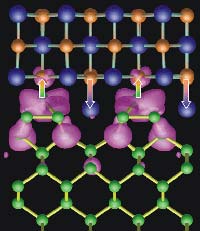
A research team at the University of California at Santa Barbara (UCSB) has for the first time incorporated on a single chip both a widely tunable laser and an all-optical wavelength converter, thereby creating an integrated photonic circuit for transcribing data from one color of light to another. Such a device is key to realizing an all-optical network. This research is being funded by a Defense Advanced Research Project Agency (DARPA) Microsystems Technology Office (MTO) grant to push the boundary

Research led by Professor Paul Sharp at The University of Nottingham’s Institute of Genetics has shed further light on the origins of HIV-1, the virus that causes AIDS.
For more than 10 years, Professor Sharp has been collaborating with Professor Beatrice Hann, at the University of Alabama, on research aimed at clarifying the origins and evolution of AIDS viruses. In 1999, this team identified the origin of HIV-1 as being transmission of a virus (SIVcpz) from chimpanzees to humans, but a mys

For just pennies per person per year, the new Global Alliance for Improved Nutrition (GAIN) plans to bring the benefits of foods fortified with vitamins and minerals and end micronutrient deficiency for the poor in developing countries, which can save millions of lives and prevent crippling conditions such as blindness and mental retardation.
“Micronutrient deficiency also has many invisible economic effects that are widely underestimated, because they sap the energy of working-age p

Using a so-called “data-mining” method, it is possible to automatically find previously unknown side-effects of drugs in the huge WHO database of side-effect reports. This is demonstrated in a doctoral dissertation by Andrew Bate at Umeå University in Sweden.
The use of pharmaceuticals sometimes causes side-effects. By gathering reports about suspected cases of side-effects, it is possible to detect previously unknown ties between a certain drug and a side-effect at an early stage, so-calle

Researchers uncover new tumor suppression mechanism
Cancerous and precancerous cells can detect that they are abnormal and kill themselves, or remain alive indefinitely but cease proliferating, through two intrinsic processes called programmed cell death and cellular senescence. One goal of cancer chemotherapy is to help stimulate these potent antitumor processes.
Researchers at Cold Spring Harbor Laboratory on Long Island have recently shown that by locking cancer cells int

The ability to make atomic-level changes in the functional components of semiconductor switches, demonstrated by a team of Oak Ridge National Laboratory, North Carolina State University and University of Tennessee physicists, could lead to huge changes in the semiconductor industry. The results are reported in the June 13 issue of Science.
Semiconductor devices, the building blocks of computing chips that control everything from coffee makers to Mars landings, depend on microscopic solid-sta

At the Berlin synchrotron radiation source BESSY II, the largest magnetic anisotropy of a single molecule ever measured experimentally has been determined. The larger this anisotropy is, the better a…

LSU quantum researchers uncover hidden quantum behaviors within classical light, which could make quantum technologies robust. Understanding the boundary between classical and quantum physics has long been a central question…

One of the biggest mysteries in science – dark energy – doesn’t actually exist, according to researchers looking to solve the riddle of how the Universe is expanding. For the…

A team led by plant biotechnologist Prof Markus Schwarzländer from the University of Münster and biochemist Prof Bruce Morgan from Saarland University has developed new biosensors with which the ratio…

How deubiquitinases USP53 and USP54 cleave long polyubiquitin chains and how the former is linked to liver disease in children. Deubiquitinases (DUBs) are enzymes used by cells to trim protein…

Conceptual blueprint to analyze experimental catalyst data. Machine learning (ML) models have recently become popular in the field of heterogeneous catalyst design. The inherent complexity of the interactions between catalyst…

How simulations help manufacturing of modern displays. Modern materials must be recyclable and sustainable. Consumer electronics is no exception, with organic light-emitting diodes (OLEDs) taking over modern televisions and portable…

“Neurons that fire together, wire together” describes the neural plasticity seen in human brains, but neurons grown in a dish don’t seem to follow these rules. Neurons that are cultured…

The quest for sustainable energy solutions has been a major focus of scientific research for decades. Solar energy, a clean and renewable source, has emerged as a promising alternative to…

Pacific Northwest National Laboratory to contribute leadership to national effort in microelectronics design and development. Microelectronics run the modern world. Staying ahead of the development curve requires an investment that…

With a processing speed a billion times faster than nature, chip-based laser neuron could help advance AI tasks such as pattern recognition and sequence prediction. Researchers have developed a laser-based…

New technology could remotely identify various types of plastics, offering a valuable tool for future monitoring and analysis of oceanic plastic pollution. Researchers have developed a new hyperspectral Raman imaging…